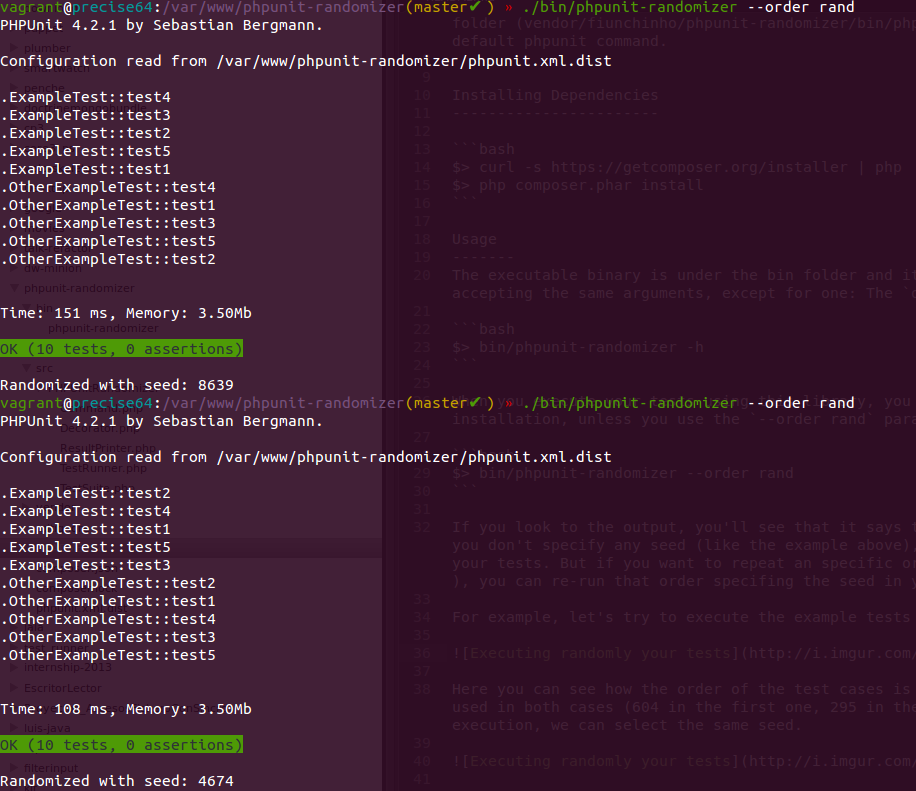Testing class rules
suggest changeLet’s say, we have a simple LoginForm class with rules() method (used in login page as framework template):
class LoginForm {
public $email;
public $rememberMe;
public $password;
/* rules() method returns an array with what each field has as a requirement.
* Login form uses email and password to authenticate user.
*/
public function rules() {
return [
// Email and Password are both required
[['email', 'password'], 'required'],
// Email must be in email format
['email', 'email'],
// rememberMe must be a boolean value
['rememberMe', 'boolean'],
// Password must match this pattern (must contain only letters and numbers)
['password', 'match', 'pattern' => '/^[a-z0-9]+$/i'],
];
}
/** the validate function checks for correctness of the passed rules */
public function validate($rule) {
$success = true;
list($var, $type) = $rule;
foreach ((array) $var as $var) {
switch ($type) {
case "required":
$success = $success && $this->$var != "";
break;
case "email":
$success = $success && filter_var($this->$var, FILTER_VALIDATE_EMAIL);
break;
case "boolean":
$success = $success && filter_var($this->$var, FILTER_VALIDATE_BOOLEAN, FILTER_NULL_ON_FAILURE) !== null;
break;
case "match":
$success = $success && preg_match($rule["pattern"], $this->$var);
break;
default:
throw new \InvalidArgumentException("Invalid filter type passed")
}
}
return $success;
}
}In order to perform tests on this class, we use Unit tests (checking source code to see if it fits our expectations):
class LoginFormTest extends TestCase {
protected $loginForm;
// Executing code on the start of the test
public function setUp() {
$this->loginForm = new LoginForm;
}
// To validate our rules, we should use the validate() method
/**
* This method belongs to Unit test class LoginFormTest and
* it's testing rules that are described above.
*/
public function testRuleValidation() {
$rules = $this->loginForm->rules();
// Initialize to valid and test this
$this->loginForm->email = "valid@email.com";
$this->loginForm->password = "password";
$this->loginForm->rememberMe = true;
$this->assertTrue($this->loginForm->validate($rules), "Should be valid as nothing is invalid");
// Test email validation
// Since we made email to be in email format, it cannot be empty
$this->loginForm->email = '';
$this->assertFalse($this->loginForm->validate($rules), "Email should not be valid (empty)");
// It does not contain "@" in string so it's invalid
$this->loginForm->email = 'invalid.email.com';
$this->assertFalse($this->loginForm->validate($rules), "Email should not be valid (invalid format)");
// Revert email to valid for next test
$this->loginForm->email = 'valid@email.com';
// Test password validation
// Password cannot be empty (since it's required)
$this->loginForm->password = '';
$this->assertFalse($this->loginForm->validate($rules), "Password should not be valid (empty)");
// Revert password to valid for next test
$this->loginForm->password = 'ThisIsMyPassword';
// Test rememberMe validation
$this->loginForm->rememberMe = 999;
$this->assertFalse($this->loginForm->validate($rules), "RememberMe should not be valid (integer type)");
// Revert remeberMe to valid for next test
$this->loginForm->rememberMe = true;
}
}How exactly Unit tests can help with (excluding general examples) in here? For example, it fits very well when we get unexpected results. For example, let’s take this rule from earlier:
['password', 'match', 'pattern' => '/^[a-z0-9]+$/i'],Instead, if we missed one important thing and wrote this:
['password', 'match', 'pattern' => '/^[a-z0-9]$/i'],With dozens of different rules (assuming we are using not just email and password), it’s difficult to detect mistakes. This unit test:
// Initialize to valid and test this
$this->loginForm->email = "valid@email.com";
$this->loginForm->password = "password";
$this->loginForm->rememberMe = true;
$this->assertTrue($this->loginForm->validate($rules), "Should be valid as nothing is invalid");Will pass our first example but not second. Why? Because in 2nd example we wrote a pattern with a typo (missed \+ sign), meaning it only accepts one letter/number.
Unit tests can be run in console with command: phpunit [path_to_file]. If everything is OK, we should be able to see that all tests are in OK state, else we will see either Error (syntax errors) or Fail (at least one line in that method did not pass).
With additional parameters like --coverage we can also see visually how many lines in backend code were tested and which passed/failed. This applies to any framework that has installed PHPUnit.
Example how PHPUnit test looks like in console (general look, not according to this example):
